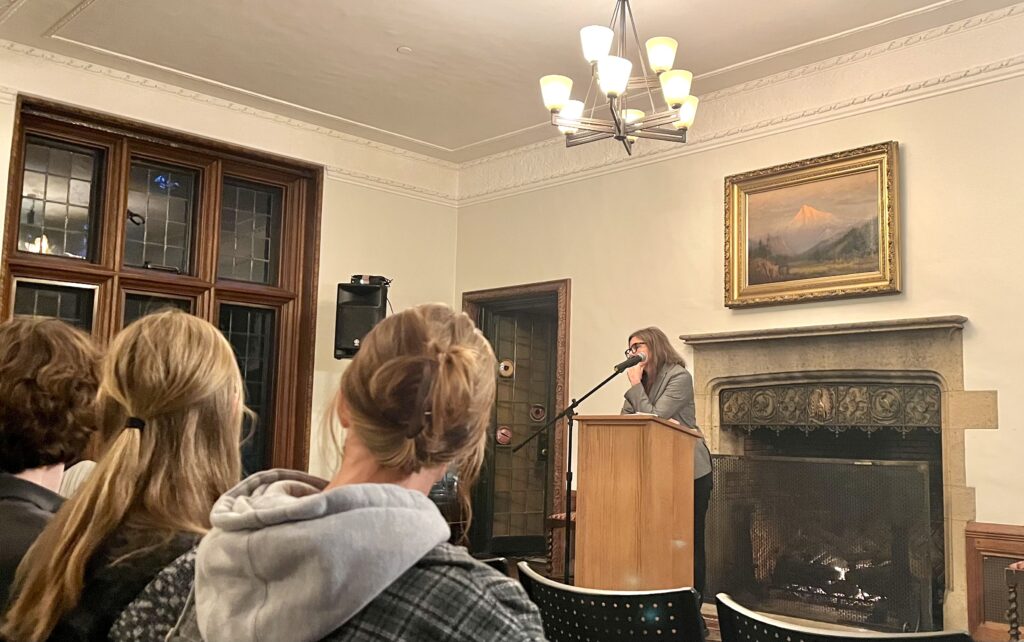On Monday, Oct. 23 in the Frank Manor House, the Lewis & Clark English Department hosted the first speaker in a series of talks this semester titled “Visiting Writers Series.” This series focuses on writers discussing their work. The first guest in the series of four was Lisa Wells, author of “The Fix,” a poetry collection that received the Iowa Poetry Prize, and “Believers,” a creative nonfiction book centering wilderness and climate change.
Associate Professor Jerry Harp introduced Wells. Harp focused on the raw humanity of Wells’ writing, particularly as it pertains to addressing climate change.
“Doing the work of addressing our ecological crisis requires accepting our messiness,” Harp said. “We are never merely addressing the planet, but ourselves as well.”
Wells then stepped up to the microphone. She began by talking about her youth, noting that although she didn’t attend college until later in her adult life, she often spent time with college students in Portland.
“To be back in Portland reading in a building like this to you feels like a full circle sort of thing to me,” Wells said.
She then spoke of her relationship with writing.
“If you’re gonna maintain a love affair with anything or any person, you have to continually reinvent the relationship and move things in,” Wells said.
She traced her love of writing throughout her life. Then, she discussed her book “Believers,” which is largely based on her experiences as a wilderness survivor when she was younger.
“There was a big pretension around animal tracking. This is the one thing we need to know in order to unlock the infinite truth of the wilderness,” Wells said. “Intimate knowledge of the world was the goal and tracking was the method for achieving it.”
Wells explained that she developed her own form of spirituality while in the wilderness.
“The so-called natural world became a sort of God to me,” she said. “The premise of tracking is that all life affects other life.”
When Wells finished speaking about “Believers,” she opened the floor to questions, of which Professor Pauls Toutonghi asked the first.
“How do you know, other than intuition, when someone has said something that you think will fit into a story or a chapter in a larger book?” Toutonghi asked.
“When you spend a lot of time doing this kind of work, you develop a muscle for it that feels a lot like intuition,” Wells replied.
She noted that normal conversations can often be groundbreaking if you pay attention to them.
“Sometimes it’s just an astonishing thing that someone says, and we have these experiences with people every day,” Wells said.
Administrative Coordinator for the English and History Departments Amy Baskin said that she loved Wells’ book.
“The interplay between the personal and the further lens works so well,” Baskin said to Wells. “The whole idea of dynamic interplay makes me feel connected to it.”
Baskin then asked Wells about her thoughts on the element of play in her writing.
“I know I’m in the realm of play and I think it’s great,” Wells replied.
She said that she loves the rules of writing poetry because they can enable creative expression that is limited in other forms of writing.
“Poetry unlocks other forms of consciousness than prose does. The quality of intention is povertized; it’s harder to access these other forms of being,” said Wells.
Hartman commented on Wells’ portrayal of radical ecological groups.
“As I was reading believers and encountering all these quirky, off-beat activists, the tone becomes increasingly complex,” Hartman said.
Hartman asked Wells for her thoughts on these groups, since she portrays them impartially.
“(I empathize with) the ways in which people are resiliently trying to take their pain and brokenness and make beauty, make life,” Wells said.
She said that her emphasis on nuance is just a facet of her thought processes.
“I move toward complexity not by design but because abstraction doesn’t mean anything to me,” Wells said.
Wells ended the talk by noting her sensitivity toward reactionary climate activists and radical groups.
“It’s tough to be so small and to have your life so profoundly affected by these forces that are so much larger than you,” she said.
The next talk in this series will be given by author Ama Codjoe on Feb. 5 at 6 p.m. in the Frank Manor House.
Subscribe to the Mossy Log Newsletter
Stay up to date with the goings-on at Lewis & Clark! Get the top stories or your favorite section delivered to your inbox whenever we release a new issue.



Leave a Reply